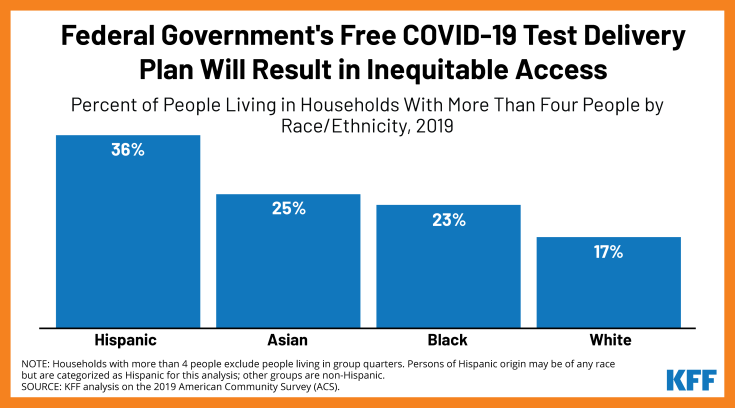Providing an Equal Number of Free COVID-19 Tests to U.S. Households Results in Inequitable Access
The Biden Administration this week launched a website and toll-free phone line allowing people to request four COVID-19 tests per household. These tests would be provided by the federal government as part of an effort to expand access to at-home tests, which have been in limited supply.
Directly mailing an equal number of free tests to households through the U.S. Postal Service (USPS) will increase availability and allow for faster implementation. Moreover, mailing free tests may increase access for people who are not able to pay upfront costs to purchase tests from retailers and/or who do not have health insurance to reimburse test costs. The White House also has indicated that the first 20% of each day’s orders will go to areas that experienced high rates of cases and deaths, which will help ensure that disproportionately affected areas are among those first to receive them.
However, providing an equal number of tests to every household without accounting for size of the household or the risk of household members will result in inequitable access to the tests. Other countries are distributing free tests at the individual level—the United Kingdom, for example, allows individuals to order up to seven tests per day through a website or phone line, which are mailed to their home or available for pick up from a local pharmacy or checkpoint.
Hispanic, Asian, and Black people are more likely than White people to live in households with more than four people, where not everyone will receive a free COVID-19 test from the federal government. Hispanic, Asian, and Black people also are more likely than White people to live in multi-unit structures, like apartments. Early reports suggested that some people living in multi-unit buildings were not able to order COVID-19 tests because an order was already marked to their address. However, the USPS told news outlets that the problem affected a “small percentage of orders,” and White House officials said the government is working to address website bugs. Analysis further shows that Hispanic and Black people are less likely to have internet access at home, making it more challenging for them to order tests without a phone option. At the same time, people of color likely have increased need for tests because they often are employed in jobs that cannot be done remotely.
This inequity in access to free tests is yet another example of the consistent theme of inequities over the course of the pandemic. Compared to their White counterparts, people of color have faced increased risk of exposure to the virus, suffered more illness and death, and faced more barriers to accessing protective equipment, testing, care, and treatment, as well as vaccines. These disparities in COVID-19 mirror and are driven by underlying inequities in health and health care that are rooted in racism and discrimination. Policies that do not recognize or account for underlying differences and inequities will perpetuate and further widen disparities going forward.

